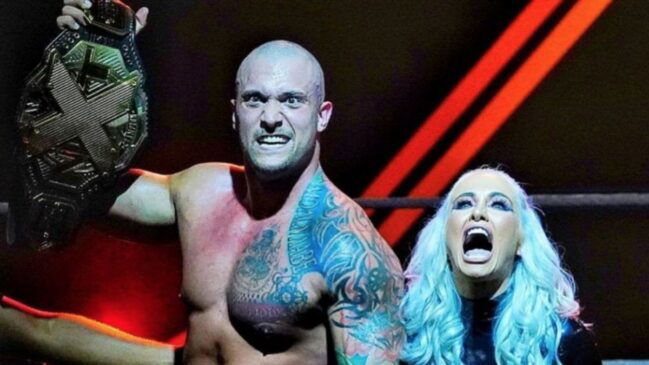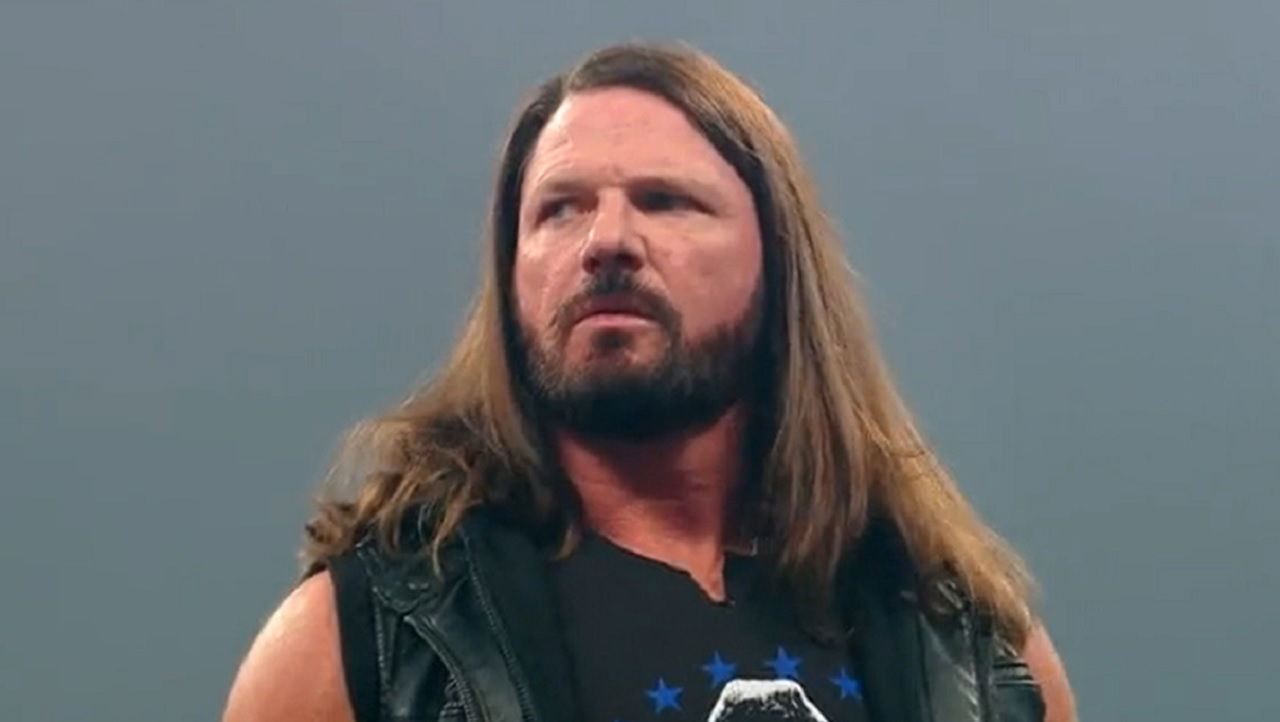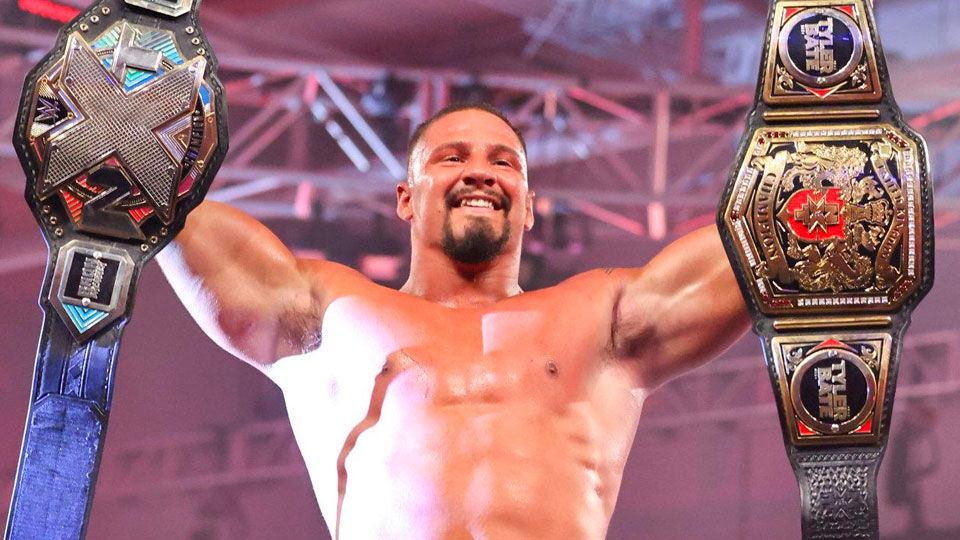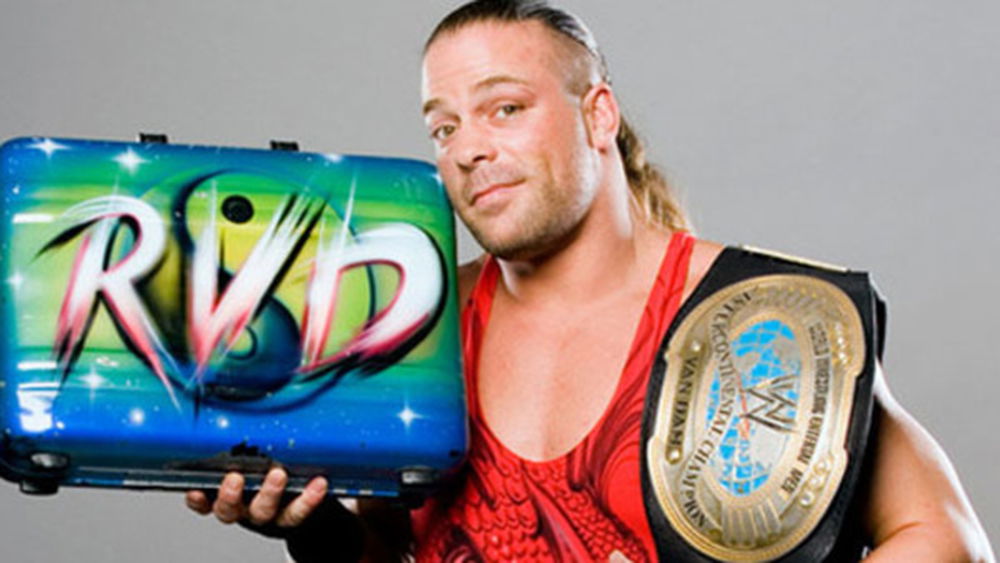Life is Fighting – Karrion Kross
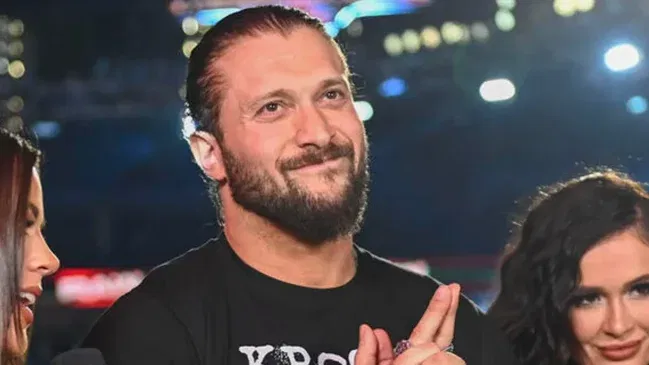
One of my most memorable moments of this year’s Wrestlemania was when someone not even on the card, spoke on a post-WM41 show venting his frustration at WWE. “Go f*ck yourself. That’s from Killer Kross,” Karrion Kross yelled at the end of an absorbing three-minute tirade, referring to his pre-WWE moniker of ‘Killer’.
Incidentally, Kross AKA Kevin Robert Kesar, is releasing his first memoir later this year entitled Life is Fighting. The cynic in me would believe he’d created a viral moment about himself to create publicity to flog his book, but having read his words and understanding more about the man himself, I assure you that’s absolutely not the case.
He had been involved in the Logan Paul vs. AJ Styles match on Wrestlemania Sunday, taking a punch from AJ after attempting to help him utilise heelish tactics. Supposedly selling lots of tees on WWE Shop at this time, but struggling to get over on TV, he felt he wasn’t getting the push he deserved on WWE programming.
He even produced a documentary showing his Wrestlemania week and the side to him many fans don’t see on WWE TV; a side that he desperately wants to be seen. He spoke of his dismay at not being on the Wrestlemania card in his home town, and not being able to express himself more creatively. #PushKarrionKross was trending on X.
He’s also been known to put his hand in his own pocket to create promos, such is his desire to succeed in pro wrestling.
The only thing he’s maybe guilty of, is trying too hard to perfect his craft.
His upbringing in combat sports started at an extremely young age in a desperately gritty, dank and dangerous part of New York City. A particular story about a man in his dad’s car trunk was a marked moment in his young life.
Somewhat motivational as well, despite the often negative tone, he is a strongly spiritual man. He’s not afraid to veer away from just talking about wrestling.
“As a child, you’re told you can be whatever you want when you grow up, but at some point, reality sets in and those same people push college or a university on you so you can find a good-paying job and develop a set of skills,” he writes.
“We’re not raised by our parents with disillusions that are deliberately meant to work against us, but as we begin to figure this life out, the time does come when somebody must break the bad news to us. Someone eventually shatters the dream with reality. Some may never psychologically recover from those types of negative situations. Negative situations are sadly a part of life. Negative situations are never ending, and while that statement may feel very pessimistic and hopeless, optimistic situations are endless, as well. They go hand in hand.”
Kevin Kesar is a man with not just a deep-rooted fandom of the business, but a passion that burns more than just wanting to enjoy it from the sidelines. You can really believe through his words how much he has invested in character work and acted as a sponge throughout his younger years, taking everything in.
He even offers a three-step program to convert non-wrestling fans into fans.
“I think about converting non-fans into fans constantly, and I am proud to have seen the tangible evidence play out right in front of my eyes for years. I’ve loved being part of the creative process and providing a window of opportunity for people to give what we do a shot. I can look back at the almost a decade of my life I’ve put into my work and feel proud.”
Scarlett Bordeaux, a key, vital cog in his life, is obviously talked about a lot. Despite an instant connection, it took time for the pair to accept their fate.
“We could feel this magnetic pull between us but were both trying to fight it.” He was smitten but attempting to ignore it, such was his mental state at the time.
He seems a genuinely interesting person who thinks outside the box not just within the business, but life itself. And also a man of morals. We discover a story about him humbling an unnamed talent who thought he ruled the locker room. You can tell Kross is a deep-thinker, or critical-thinker, if you will. A man who visualises endless scenarios of how his life could pan out, and is patient when selecting which is best.
He refers to this era of his life as his “demon years”. A young man, unsure of his belonging in life, but yearning to be someone. Violence was a trait in his behaviour that could erupt when his buttons were pushed.
“Looking back at these demon years I realize now that in truth, at that age, I still felt as if I was trapped socially and professionally in the economic and socioeconomic systems that I was never going to escape,” he reflects. “I was living paycheck to paycheck and never able to put aside enough money to save, and I was going into debt. That’s why I was a hothead and why I was so pissed off all the time. It was due to my inability to identify why I felt so suffocated or trapped.”
He’s quick to feel bad or apologetic though, should his opposer back down, apologise or become submissive. A strong but forgiving character.
Deeply connected to his creative side, there’s a special mention for Jeremy Borash and Jimmy Long in NXT who worked alongside him.
“I’ve physically, mentally, and even spiritually suffered for the development of this character to get it as entertaining as possible. It can be a terrifying experience to be poorly produced as a professional wrestler, sports entertainer, or artist because you don’t want it to look cheap, stupid, or foolish.”
“In my early twenties, I took creative inspiration from millions of things: novels, movies, TV shows, wrestlers, real-life experiences, and wrestling DVDs.”
He makes it very clear that the talent themselves should be able to paint their own picture and not have someone else holding the brush. I enjoyed reading about his creative process and getting an insight into how his brain works.
“It is a profession that requires everything you have to succeed, and it still may not be enough. Despite hearing all the realities, I knew what I needed to do. I needed to step up and follow through. So, I approached wrestling school as if it were the military. I was not going to waste anybody’s time, and certainly not my own. I knew what I wanted to do with pro wrestling, and I needed to catch up as quickly as possible.”
We read of Kross using his initiative and that creative spark to get a big independent match with Jon Moxley after his WWE release. The chapter about his NXT arrival delves even deeper into his mindset and understanding of character work and making the effort to be unique.
It’s easy to forget how unlucky he was in 2020. His push and eventual reign as NXT champion came during the depressing pandemic era with no fans in attendance. He and Scarlett’s subsequent promotion to Raw demonstrably demotivated him and ruined all the said momentum he’d built in NXT. He’s not the first person this has happened to, and won’t be the last.
“I went from being featured in compelling stories every week for over a year to a guy working cold matches, no story, and also worked as a heel.”
A substantial chunk of the book delves into his work as a personal bodyguard and bouncer as well as a potential career in mixed martial arts that he couldn’t devote enough of himself to. There’s plenty of content delving into his spiritual mindset and journey. These build the whole story, but it’s the chapters about his creative side that I found the most enjoyable.
As a pro wrestling fan, I unquestionably found myself rooting for Kevin and his undying love for the business. With his and his wife’s contract expiring this summer, it’ll be interesting to follow the next chapter of their story.
Life is Fighting is available from Amazon on August 5th in the U.S. and September 11th in the UK.

